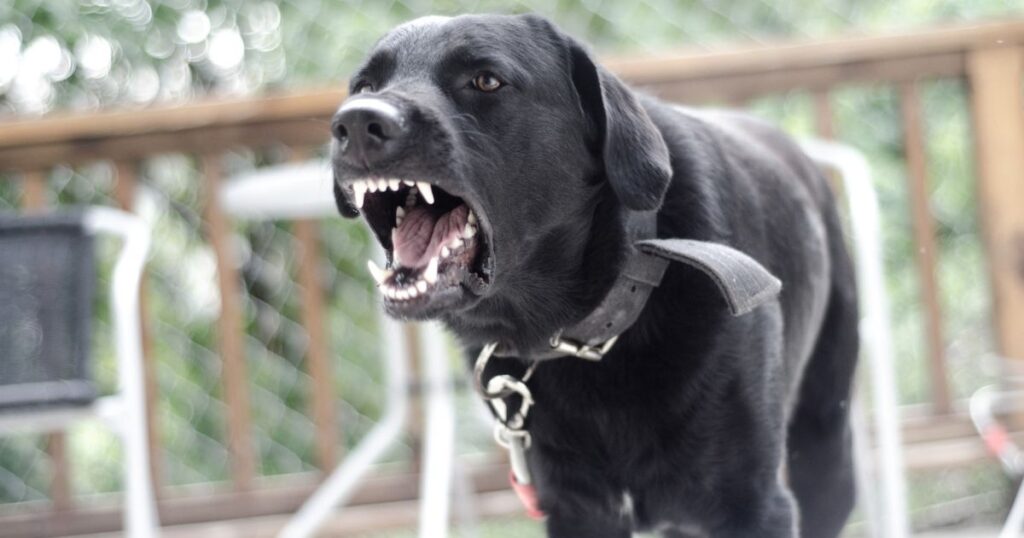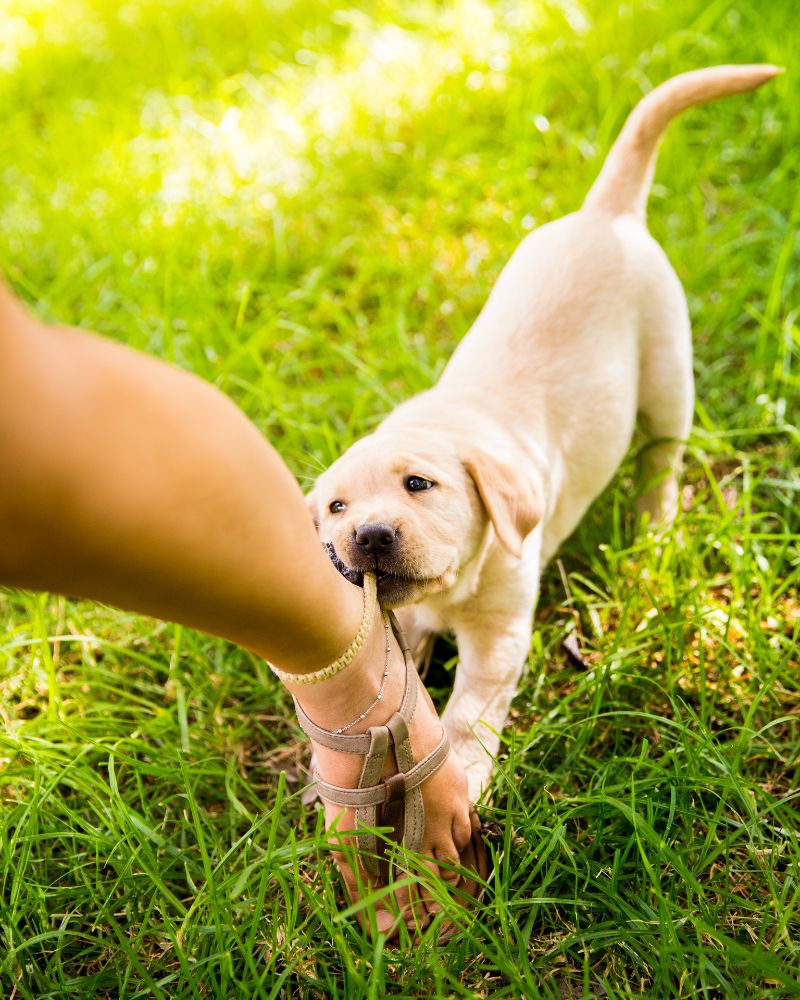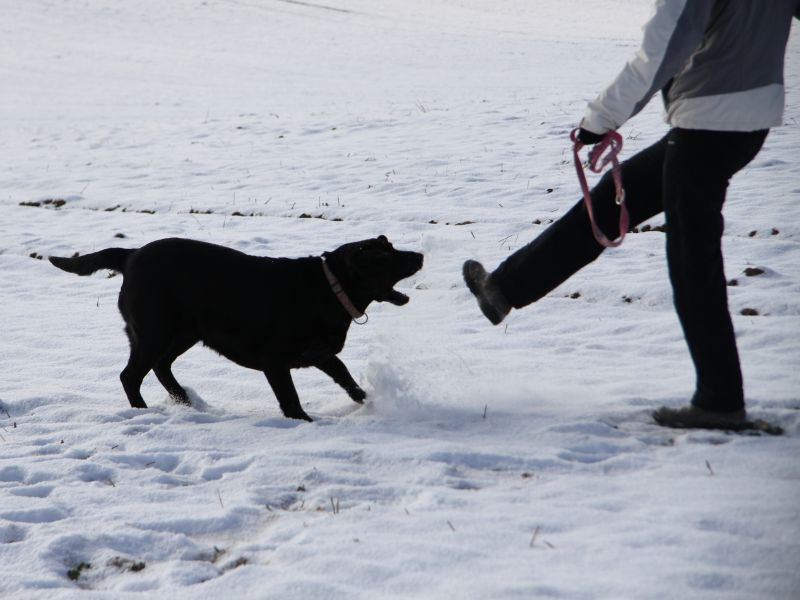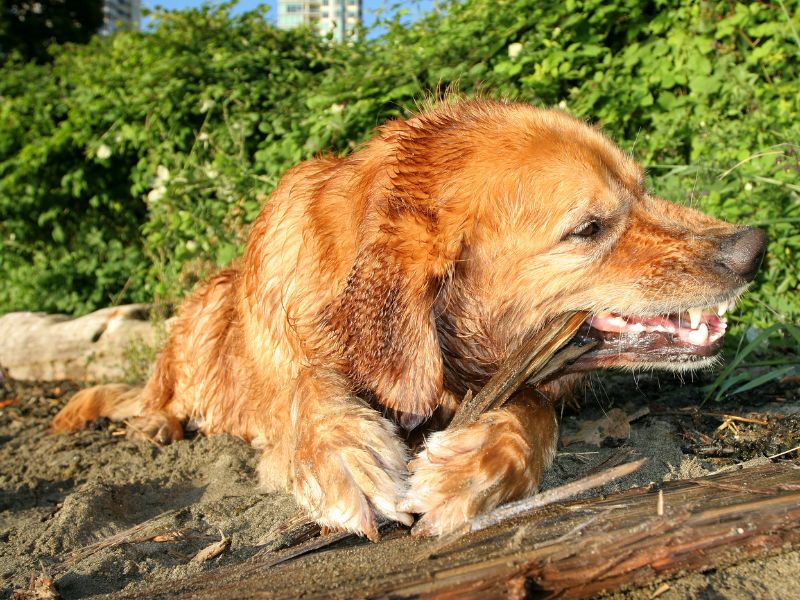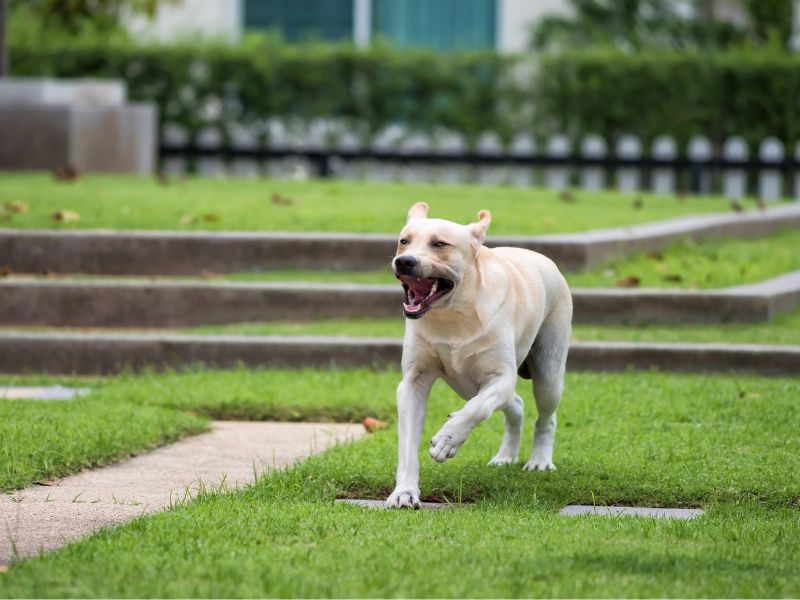Labradors are one of the most popular dog breeds in the world, known for their friendly and affectionate nature. However, many dog owners wonder if Labradors can be aggressive. While Labradors in general are not aggressive, they can exhibit aggressive behavior under certain circumstances.
According to a study published in 2008, Labradors were found to be one of the least aggressive breeds of the group of dogs involved in the study. However, like any other breed, Labradors can become aggressive if they are not properly trained and socialized. It is important for dog owners to understand the signs of aggression and the possible causes so that they can take steps to prevent it from occurring in the first place.
In this article, we will explore the topic of Labrador aggression, its causes, and how to address and prevent it. We will look at the signs of reactivity in Labs, fear aggression vs frustration, predatory responses, and medical problems that can cause aggression. We will also discuss effective training plans, how to establish yourself as the alpha of your pack, and the best treats and interactive toys to reward positive behavior. By the end of this article, readers will have a better understanding of how to deal with an aggressive Labrador and how to prevent aggressive behavior from occurring in the first place.
Labrador Temperament
Labrador Retrievers are known for their friendly and outgoing temperament. They are generally patient, kind, and even-tempered, making them great family dogs. However, like any breed, individual Labradors can have behavioral issues, including aggression.
It’s important for owners to understand the signs of aggression in Labradors and to address any issues as soon as they arise. Aggression can be caused by a variety of factors, including fear, frustration, predatory responses, and medical problems.
Owners can help improve their Labrador’s behavior by identifying the cause of aggression and developing an effective training plan. Positive reinforcement is an effective training method for Labradors, and regular exercise and mental stimulation can also help reduce aggressive behavior.
Overall, while Labradors are generally not known to be aggressive dogs, it’s important for owners to be aware of potential behavioral issues and to take steps to address them if they arise.
Are Labradors Aggressive?
Labradors are known for their friendly and outgoing personality. In general, they are not an aggressive breed. A study published in 2008 found that Labradors were one of the least aggressive breeds among the group of dogs involved in the study. However, like any other dog breed, Labradors can become aggressive under certain circumstances.
One of the most common reasons for a Labrador to become aggressive is lack of proper training and socialization. If a Labrador is not trained and socialized properly, it can develop aggressive behavior towards other dogs, animals, and even humans. This can be especially problematic if the Labrador is an adult dog and has already developed aggressive behaviors.
Another reason for a Labrador to become aggressive is fear. Fear can arise from past bad experiences with previous owners or other animals. The Labrador can come from owners or puppy mills that abused the pup, so it developed aggression as a defense mechanism. Aggression and fear can also be noticed in a pup during bad thundery weather and fireworks.
It’s important to note that aggression in Labradors is not common and can be avoided with proper training and socialization. Gentle disciplining a dog, including just ignoring a dog that is behaving poorly, can help prevent aggression. If a Labrador is showing signs of aggression, it’s important to seek the help of a professional dog trainer or behaviorist to correct the behavior.
Background of The Labrador
The Labrador Retriever, or simply the “Labrador,” is a breed of dog that originated in Newfoundland, Canada. They were originally bred to assist fishermen in retrieving fish that had escaped from fishing nets. Later on, they were used as hunting dogs, particularly for retrieving game birds. Today, Labradors are one of the most popular dog breeds in the world, known for their friendly and outgoing personalities.
Labradors are medium to large-sized dogs, with males typically weighing between 65-80 pounds and females weighing between 55-70 pounds. They have a short, dense coat that comes in three colors: black, yellow, and chocolate. Labradors are known for their high energy levels and love of exercise, making them great companions for active families.
One of the reasons why Labradors are so popular is their friendly and gentle nature. They are known for being great with children and other pets, and are often used as therapy dogs due to their calm and patient demeanor. However, like any breed of dog, Labradors can become aggressive if they are not properly socialized or trained. It is important for owners to provide their Labradors with plenty of exercise, training, and socialization to ensure that they remain well-behaved and friendly.
Do You Have an Aggressive Lab Puppy?
Labrador puppies are generally known for their friendly and playful nature. However, some puppies may exhibit aggressive behavior, which can be concerning for their owners. Signs of aggression in a lab puppy can include biting, nipping, growling, snarling, and stiff posture.
It’s important to note that some of these behaviors can also be a result of normal puppy play, fear, or learning. Therefore, it’s crucial to understand the underlying cause of the aggression before addressing it.
If you suspect that your lab puppy is exhibiting aggressive behavior, it’s recommended to seek the help of a professional dog trainer or behaviorist. They can help you identify the cause of the aggression and develop an effective training plan to address it.
It’s also important to provide your lab puppy with enough exercise and mental stimulation to prevent boredom, which can lead to destructive behavior. Positive reinforcement training techniques, such as rewarding good behavior with treats and praise, can also be effective in addressing aggression in lab puppies.
What Causes Labrador Puppy Aggression?
Labrador puppies are generally known for their friendly and outgoing nature. However, some Labradors may exhibit aggressive behavior, which can be a cause of concern for their owners. There can be several reasons behind Labrador puppy aggression, including:
- Lack of socialization: If a Labrador puppy is not exposed to different people, animals, and environments during the critical socialization period, they may become fearful and aggressive towards unfamiliar situations or individuals.
- Fear: Labrador puppies may become aggressive when they feel threatened or scared. Fear aggression can be triggered by loud noises, sudden movements, or unfamiliar people or animals.
- Protectiveness: Labrador puppies may become aggressive when they feel the need to protect their territory or their family. This can be especially true if they are not properly trained or socialized.
- Medical issues: Aggression can be a symptom of an underlying medical issue, such as pain or hormonal imbalances. It is important to rule out any medical causes before addressing aggression through training or behavior modification.
It is important to note that aggression in Labrador puppies should be addressed as soon as possible to prevent it from escalating. Proper socialization, training, and behavior modification techniques can help address aggression in Labrador puppies and ensure that they grow up to be well-adjusted and friendly dogs.
Picking a Happy Puppy
When selecting a Labrador puppy, it is important to assess their temperament to ensure they are a good fit for your family. Look for a puppy who is curious, friendly, and outgoing. Avoid puppies who seem overly shy, aggressive, or fearful.
It is also important to consider the puppy’s socialization. A well-socialized puppy will be more confident and adaptable in new situations. Ask the breeder if the puppies have been exposed to different people, animals, and environments.
Additionally, pay attention to the puppy’s body language. A happy puppy will have a relaxed body, wagging tail, and may even approach you with a playful demeanor. On the other hand, a stressed or anxious puppy may have a tense body, tucked tail, and avoid eye contact.
Overall, taking the time to select a happy and well-adjusted Labrador puppy will lead to a more enjoyable and fulfilling relationship with your new furry friend.
Get Pippa’s Training Tips!
Pippa’s training tips can help ensure that your Labrador is well-behaved and not aggressive. Pippa has been breeding, training, and working with Labrador Retrievers for over thirty years, and she has a wealth of information to share.
One of Pippa’s top tips is to establish basic dog commands. This includes teaching your dog to sit, stay, come, and heel. Consistent training routines are also important, as is proper socialization. Exercise and activity are critical to keeping your dog calm and well-behaved.
If you are concerned that your Labrador might be aggressive, it is important to monitor their behavior and response to new situations. Seek help from a professional trainer if necessary.
Pippa’s training guides take you step-by-step through the training process, breaking it down into achievable stages. With Pippa’s help, you can ensure that your Labrador is a well-behaved and happy family pet.
What Type of Training is Best?
When it comes to training a Labrador, positive reinforcement techniques have proven to be highly effective Labrador Time. This type of training involves rewarding good behavior with treats, praise, or toys, rather than punishing bad behavior. It helps to build a strong bond between the owner and the dog, and encourages the dog to repeat good behavior.
Consistency is key when training a Labrador. A regular training routine can help to establish good habits and prevent bad behavior from developing. This includes setting clear rules and boundaries, and sticking to them. It is also important to provide plenty of exercise and mental stimulation to keep the dog engaged and happy.
Socialization is another important aspect of training a Labrador. Exposing the dog to different people, animals, and environments from a young age can help to prevent fear and aggression. It is important to monitor the dog’s behavior and response to new situations, and seek help if necessary.
Overall, positive reinforcement, consistency, and socialization are the best types of training for Labradors. By using these techniques, owners can help their dogs to develop good behavior and prevent aggression.
Aggressive Labrador Retriever – Does the Type of Lab Make a Difference?
Labrador Retrievers are generally known for their friendly and gentle nature. However, like any other dog breed, some Labs may exhibit aggressive behavior. It is important to note that aggression in Labs is not breed-specific and can occur in any type of Labrador Retriever.
There are three main types of Labrador Retrievers: American, English, and Canadian. While some people believe that certain types of Labs are more prone to aggression than others, there is no scientific evidence to support this claim. Aggressive behavior in Labs can be caused by various factors such as fear, frustration, lack of socialization, and medical issues.
It is important for Labrador Retriever owners to understand that aggression is a serious issue that should not be ignored. If a Lab exhibits aggressive behavior, it is crucial to seek professional help from a veterinarian or a certified dog behaviorist. With proper training and socialization, aggressive behavior in Labs can be corrected and managed.
Are Black Labs Aggressive?
Labrador Retrievers, including black Labs, are known for their friendly and gentle nature. They are generally not aggressive, and studies have shown that they are one of the least aggressive breeds of dogs. However, like any other dog, they can become aggressive if they feel threatened or are not properly trained or socialized.
Black Labs are gentle and friendly dogs, and they will only become aggressive when pushed to their limits, to protect their family, or if they have been abused. It is important to note that aggression in dogs is often a result of fear or anxiety, and it is essential to identify and address the root cause of the behavior.
Proper training and socialization are crucial to prevent any aggressive behavior in black Labs. They need to be exposed to different people, animals, and environments to help them become well-adjusted and confident dogs. Early training can also help prevent aggressive behavior from developing.
In summary, black Labs are not aggressive dogs, and their behavior is not any different from other Labradors. They are gentle, friendly, and loyal companions who can become aggressive if they feel threatened or are not properly trained or socialized.
Are Chocolate Labs Aggressive?
Labrador Retrievers are known for their friendly and gentle nature, but there is a common misconception that chocolate Labs are more aggressive than other Labs. However, this is not true. Color alone is not a determinant of trait or character. Whether chocolate, black, or yellow, Labradors can have traits that differ from the usual friendliness we are used to if they have been exposed to poor environmental conditions.
That being said, it is important to note that individual Labradors, regardless of their color, can exhibit reactive and aggressive behavior. The reasons or motivations for their behavior will vary, and it is important to identify the underlying cause and address it appropriately.
Lower trainability in chocolate Labs is linked to their genes, careless breeding, and their traditional use as show dogs. However, this does not necessarily make them more aggressive. Chocolate Labs can be just as friendly and well-behaved as any other Lab if they are properly trained and socialized.
In conclusion, the color of a Labrador does not determine their aggression levels. While individual Labs can exhibit reactive and aggressive behavior, it is important to address the underlying cause and provide proper training and socialization.
What if You Find Your Labrador Suddenly Aggressive?
Labradors are generally known for their friendly and gentle nature. However, there may be instances where a Labrador may suddenly display aggressive behavior. In such cases, it is important to identify the cause of the aggression and take appropriate measures to address it.
One reason for sudden aggression in Labradors could be fear. Fear aggression is triggered when a dog perceives a threat and feels the need to defend itself. This could happen if the dog is in an unfamiliar environment or if it encounters a new person or animal that it perceives as a threat. In such cases, it is important to remove the dog from the situation and give it time to calm down.
Another reason for sudden aggression could be pain or discomfort. If a Labrador is experiencing pain or discomfort, it may become more irritable and aggressive. It is important to take the dog to a veterinarian to rule out any underlying medical conditions.
Sometimes, sudden aggression could be due to a lack of physical activity. Labradors are active dogs and require regular exercise to burn off excess energy. If a Labrador is not getting enough exercise, it may become restless and irritable, leading to aggressive behavior.
In conclusion, sudden aggression in Labradors can be a cause for concern. It is important to identify the cause of the aggression and take appropriate measures to address it. By understanding the underlying causes of aggression and taking proactive steps to prevent it, owners can ensure that their Labradors remain happy and healthy.
Causes of Sudden Labrador Aggression
Labradors are generally known for their friendly and gentle nature, but they can become aggressive under certain circumstances. Here are some common causes of sudden Labrador aggression:
- Pain or discomfort: If a Labrador is in pain or discomfort due to an injury or illness, they may become aggressive. It is important to take them to a veterinarian to rule out any underlying medical issues.
- Fear or anxiety: Labradors may become aggressive if they feel threatened or scared. This can be caused by a variety of factors, such as loud noises, unfamiliar people or animals, or changes in their environment.
- Protectiveness: Labradors are naturally protective of their owners and their territory. If they feel that their owner or their home is being threatened, they may become aggressive.
- Lack of socialization: If a Labrador has not been properly socialized, they may become aggressive towards unfamiliar people or animals. It is important to socialize them from a young age to prevent this.
- Training or behavior issues: If a Labrador has not been trained properly or has developed bad habits, they may become aggressive. It is important to address any behavior issues early on to prevent them from escalating.
It is important to note that aggression in Labradors is not common and can often be prevented with proper training and socialization. If a Labrador does become aggressive, it is important to seek the help of a professional dog trainer or behaviorist.
Find Out More
If you want to learn more about labrador aggression, there are plenty of resources available online. A good place to start is The Labrador Site, which provides an overview of labrador temperament and potential behavioral issues. Another helpful resource is Petwah, which explains the different types of aggression in dogs and how to prevent them.
For more specific advice on dealing with an aggressive labrador, Dogisa offers tips on identifying the cause of aggression and developing a training plan. The Labrador Family also provides a comprehensive guide on how to deal with an aggressive labrador, including establishing yourself as the alpha of your pack and using positive reinforcement when training your dog.
It’s important to remember that labradors are generally friendly and patient dogs, but like any breed, they can have behavioral issues. With the right training and care, however, most labrador aggression can be prevented or managed.
References
Labrador Retrievers are generally known for their laid-back, friendly, and patient personality, which makes them great family dogs. However, some Labradors can have behavioral issues. According to a study in canine aggression published in 2008, Labrador Retrievers are among the least aggressive dog breeds. They are not aggressive towards human beings or other dogs. Any aggressiveness in a Labrador Retriever is due to external factors rather than the breed itself.
If a Labrador Retriever is reactive towards other dogs on walks, try to find alternative places with fewer dogs and keep your distance by turning around calmly before your dog can react. Aggressive behavior which has generalized in this way is much harder to change. Unexpected aggression should result in a vet trip as it might be a sign of an underlying health issue.
Labradors often become aggressive when feeling threatened or scared by something unfamiliar to them, like another dog or person entering their space without permission. This behavior usually stems from a lack of proper socialization as puppies. If a pup isn’t exposed to different people and situations early on, they may feel uncomfortable. Gentle disciplining a dog, including just ignoring a dog that is behaving poorly, can help avoid aggression.
It is important to note that each dog has its own personality, and the way the dog has been trained and raised can affect its behavior. Signs of aggression as a puppy include excessive nipping, barking, and even staying away from people. It is essential to train and socialize a Labrador Retriever from an early age to ensure that they grow up to be well-behaved and friendly dogs.
Have You Had an Experience with an Aggressive Labrador?
Labradors are generally known for their friendly and gentle nature. However, some Labradors can display aggressive behavior. If you have ever had an experience with an aggressive Labrador, you know how stressful and upsetting it can be. It can also be dangerous if the dog is not properly trained and managed.
Aggressive behavior in Labradors can be caused by various factors such as fear, frustration, and medical problems. It is important to identify the cause of the aggression and develop an effective training plan to help improve their behavior. Establishing yourself as the alpha of your pack and using positive reinforcement when training your dog can also be helpful.
It is important to note that aggression is a learned behavior and can be prevented through proper breeding and raising. If you are considering getting a Labrador, it is important to do your research and choose a reputable breeder who prioritizes temperament and behavior.
If you have had an experience with an aggressive Labrador, it is important to seek the help of a professional dog trainer or behaviorist. They can provide guidance and support to help you and your dog overcome the aggression and improve your relationship.

